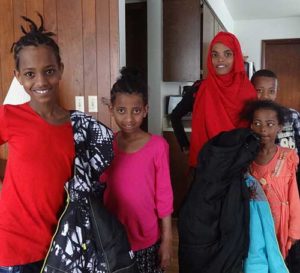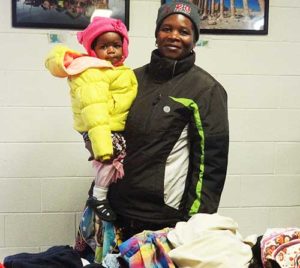ST. FRANCIS — “For I was hungry and you gave me food, I was thirsty and you gave me drink, a stranger and you welcomed me” — Mt 25:35.

Refugees from the Congo are among the recipients of new winter coats, thanks to a cold weather drive coordinated by Catholic Charities of the Archdiocese of Milwaukee. According to Ricardo Cisneros, chief operating officer of Catholic Charities, President Trump’s Jan. 27 executive order banning immigration from seven mostly Muslim nations, has direct impact on the agency’s ability to serve refugees. (Submitted photo courtesy Catholic Charities)
These are unsettling times for all concerned with immigration policies, refugee status and aiding families in need.
Catholic Charities of the Archdiocese of Milwaukee has worked with settling refugees from four of the seven countries listed in President Donald Trump’s executive order of Jan. 27, banning immigration from those mostly Muslim nations and the United States’ Syrian refugee program. According to Ricardo Cisneros, chief operating officer of Catholic Charities, there is much confusion for many of the families waiting for their loved ones as well as for the potential refugees.
“To understand, one must put themselves in the place of a refugee fleeing their home and country to protect their life and their family,” he said. “Imagine their fear, uncertainty, separation from loved ones and degradation of their life and livelihood.”
Additionally, the temporary ban on Iraqi visas may directly endanger the lives of the interpreters and translators who served alongside U.S. forces in Iraq. The United States Conference of Catholic Bishops explained that by denying this population visas, these individuals and their families may be targeted by adversaries and killed for service to the United States.
While there is concern about terrorism and crime, the USCCB states that resettled refugees are eager to give back to the country that has welcomed them and make significant economic and cultural contributions to their communities.
“This order has direct impact on our ability to serve refugees who are already resettled through our agency,” said Cisneros. “We work with families for up to five years. We have been faced with difficult challenges by this order, and have needed to make significant adjustments in our plans to maintain a quality program for our refugees.”
While Catholic Charities worked with refugees from Burma/Myanmar, Congo, Cuba, Iran, Iraq, Somalia and Syria, the number is directly dependent upon the president’s decision for the number of refugees to enter the United States, explained Cisneros.

A woman and a young child from the Congo are among the recipients of new winter coats, thanks to a cold weather drive coordinated by Catholic Charities of the Archdiocese of Milwaukee. (Submitted photo courtesy Catholic Charities)
“We provide them with assistance to find housing, jobs, schools, health care, ESL (English as a Second Language) classes, cultural orientation and driver’s license education,” he said. “Our Refugee Resettlement program was just awarded for their outstanding service.”
Archbishop Jerome E. Listecki told a group of 2,000 students at Waukesha Catholic Memorial during Catholic Schools Week that “When we change our hearts, that suddenly we’ll be able to change our society.”
He said striking a delicate balance between protectionism and generosity is imperative when dealing with immigration policy. While he wasn’t surprised that the president took swift action, he wished the policies were more thought out.
“You’ve got to balance those two things. The rights of immigrants, the tradition that we have as a nation to welcome them, especially those fleeing from persecution, but to also protect the sovereignty of the country,” he said. “Every country has a right to protect its borders, but as an immigrant church, we must also continue to protect those who need and ask for our help.”
Many church leaders claim the order should be replaced with a more humanitarian policy.
Last Friday, a federal judge in Seattle imposed a temporary restraining order on the president’s ban in response to a case filed by Washington state and Minnesota challenging Trump’s constitutional authority to unilaterally impose such a sweeping ban.
On Saturday, a federal appeals court denied a Trump administration request to lift the restraining order and allow the immigration ban to continue. Vice President Mike Pence argued that the federal judge who halted the temporary immigration ban was in error and vowed to use all legal means available to protect the American people.
The United States Council of Catholic Bishops strongly opposes the president’s order that suspends visas, admissions and other immigration benefits for immigrants and non-immigrants for 30 days from Syria, Iraq and several other designated countries.
Locally, the USCCB and Catholic Charities partners strongly support a refugee program that is safe for refugees and safe for the communities that welcome them.
“Based on our experience welcoming refugees, we have a strong, safe program. It is that way because the government has been continually strengthening it over the life of the program, something we very much support and want to continue,” stated the USCCB in a talking points memo.
The U.S. refugee program is operated by three federal agencies, the Bureau of Population, Refugees, and Migration of the U.S. State Department; the Office of Refugee Resettlement of the Department of Health and Human Services and the asylum division of the U.S. Citizenship and Immigration Service of the Department of Homeland Security (DHS).
These agencies work with international organizations such as the United Nations High Commission for Refugees, to aid refugees in countries of asylum. Additionally, the Department works closely with international organizations, nongovernmental organizations and Department of Homeland Security to identity and admit refugees into the United States through its refugee admissions program.
According to the USCCB, refugees already go through extensive vetting and must pass through a series of screenings, including biographic and biometric checks, medical screenings, forensic document testing and in-person interviews.
“The information examined to confirm a refugee’s identity is checked against law enforcement and intelligence databases, including those of the National Counterterrorism Center, Department of Defense, Federal Bureau of Investigation, Department of State, and Department of Homeland Security. If there is any doubt about who a refugee is, he or she will not be admitted to the United States,” explained the USCCB.
The Wisconsin Catholic Conference, public policy arm of the state’s bishops, echoes the USCCB’s opposition to the executive order, stating that the U.S. refugee resettlement program is life-saving for the most vulnerable of the world’s refugees.
“Welcoming people fleeing violence and conflict in various regions of the world is part of our identity as Catholics. We seek to protect the vulnerable and recognize the human dignity of all. Moreover, when the United States through its resettlement program shares responsibility with refugee host cities, it helps the refugees, supports the countries, and helps to enhance peace, security and stability to sensitive regions in the world,” according to an action alert circulated by the organization last Friday.
With more than 65 million people forcibly displaced from their homes, the WCC said the need to show leadership in welcoming refugees and provide freedom from persecution is urgent.
